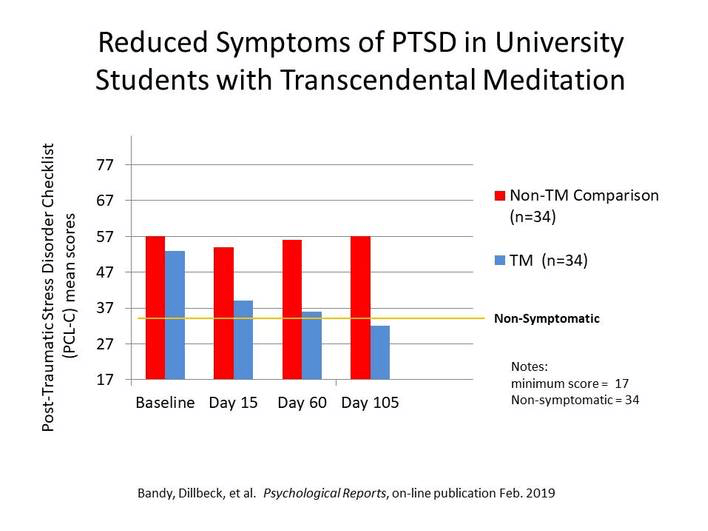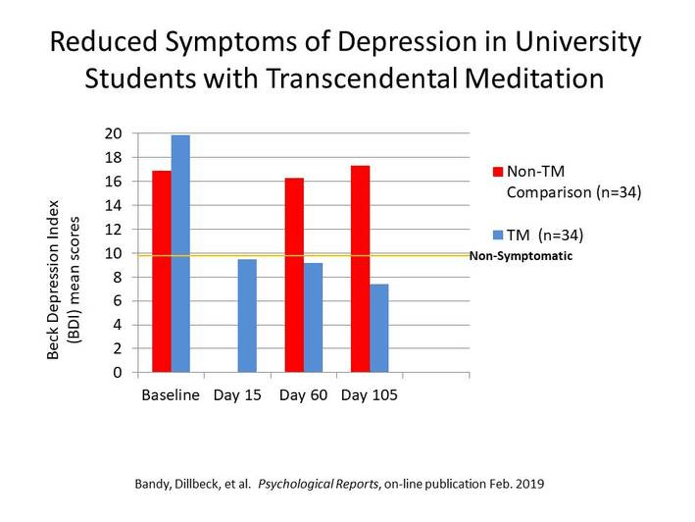Transcendental Meditation Reduces PTSD

A Psychological Reports Study: Transcendental Meditation (TM) Significantly Reduces Post-Traumatic Stress Disorder and Depression in Students
Transcendental Meditation Can Reduces Post-Traumatic Stress Disorder and Depression
by Zane Wilson
Before practicing Transcendental Meditation, it was mayhem at our school. A lot of fights were going on, basically every day. People were not friendly, they were mean. When I learned it I noticed it was different because TM is not just closing your eyes, it is deeper than that. It makes you feel better, makes you more energized and it takes away all your stress. It really, really helps. – 7th-grade student
I used to be really fidgety, I used to move a lot, couldn’t stay in my seat for very long. Now after meditating I can sit down for a whole class without standing up. Before practicing Transcendental Meditation, it was hard for me to concentrate; after practicing Transcendental Meditation, I could concentrate very well. – 7th-grade student
These children live in communities and go to schools where violence threatens them and puts them at risk for accumulating high levels of stress and even suffering post-traumatic stress disorder.
Post-traumatic stress disorder, PTSD, a chronic and debilitating condition, arises from life-threatening and deeply traumatic events: war, sexual abuse, violence, and natural disasters. Symptoms include nightmares, flashbacks, anxiety, fear, hypervigilance, emotional numbness, anger, and violent behavior, often leading to the abuse of drugs and alcohol. PTSD is a chronic, debilitating condition that may last a lifetime if not treated effectively.
PTSD is pandemic across Africa and a major problem in many areas of the world. Dr. Eugene Allers, past-president of the South African Society of Psychiatrists, estimates that as many as 25% of the population in South Africa suffer from PTSD. Research indicates that a significant number of children and adolescents in South Africa are exposed to high levels of traumatic experience, often witnessing or experiencing violence of a criminal or domestic nature. (Ensink, Robertson, Zissis & Leger, 1997; Pelzer, 1999; Seedat, van Nood, Vythilingum, Stein & Kaminer, 2000; Suliman, Kaminer, Seedat & Stein, 2005).
In the United States, the National Institute of Mental Health estimates that around 7% of Americans have or have had PTSD. However, at-risk groups like soldiers, first responders, abused women, have much higher levels of PTSD, as do people living in poor and violent communities.
Therapies utilized for facilitating recovery from PTSD include prolonged exposure, pharmaceuticals, and cognitive behavioral therapy. Also, in current use are patient education, counseling, eye movement desensitization and reprocessing (EMDR).
Transcendental Meditation effective in treating PTSD
On February 19, Psychological Reports published online a research study showing that Transcendental Meditation is also effective in the treatment of PTSD. Transcendental Meditation may be used by itself or in conjunction with psychotherapy, pharmaceuticals, and other PTSD reduction therapies.
The practice of Transcendental Meditation twice a day for 15 to 20 minutes enabled a group of university students in South Africa with PTSD to score below the threshold for PTSD in 105 days. This same group showed significant recovery from depression. A comparison group with PTSD who did not learn Transcendental Meditation showed no change in PTSD or depression levels over the 105 days of testing.
This study is the fourteenth peer-reviewed scientific paper on Transcendental Meditation and PTSD. Transcendental Meditation may also be used in conjunction with traditional PTSD reduction strategies support the recovery process.
Students at the Maharishi Institute (MI) and University of Johannesburg (UJ) with similar demographic backgrounds were first tested for PTSD by the Post-Traumatic Stress Disorder Checklist for civilians (PCL-C). Those students with a high risk of PTSD were then evaluated by a certified psychologist. Students who were deemed to have PTSD by the psychologists were enrolled in the study. They were re-tested at 15, 60 and 105 days. They also received the Beck Depression Index, a standard test of depression, because depression often accompanies PTSD.
The MI group was taught Transcendental Meditation a few days after taking the baseline tests on day one. The UJ students continued with their daily routines without any PTSD reduction interventions.
Within 15 days, the Transcendental Meditation group showed a clinically significant drop in PTSD symptoms. And their scores for depression went from mild to below the threshold.
By the completion of the 105 days, the MI students’ PTSD scores on the PCL-C had fallen below the threshold for PTSD. They stayed out of depression from day 15.
The UJ students showed no significant drop in symptoms for either PTSD or depression during the study. They were invited to learn Transcendental Meditation after the study.
A binary logistical regression analysis for the effect of Transcendental Meditation practice on PTSD PCL-C diagnosis 105 days after instruction was also highly significant, with approximately 80% scoring below PTSD threshold in the Transcendental Meditation group, whereas 88% of the UJ comparison group members were still suffering from PTSD.
The study showed a rapid and significant reduction of symptoms in the intervention group, according to lead author Dr. Carole Bandy. Results were stable over time.
A team of international researchers and psychologists from South Africa, Rwanda, and the United States, designed and implemented the study. Two psychologists from SADAG, (the South African Depression and Anxiety Group), the largest mental health NGO in SA, Lian Taljaard and Judy de Roeck, are also authors in the study. They interviewed and tested the UJ students suffering from PTSD. SADAG assists more than 180,000 people each year,
“A high percentage of young people in South Africa, especially those living in the townships, suffer from PTSD,” said co-author Michael Dillbeck. “To become successful students and productive members of society, they absolutely need help dealing with the symptoms of post-traumatic stress disorder. Our study shows, that after three months of meditation, this group, on average, was out of PTSD. It offers a way for others to effectively deal with this problem.”
Fourteen previous studies utilizing Transcendental Meditation showed reductions in PTSD on Congolese war refugees, US war veterans, and male and female prisoners.
Transcendental Meditation may be used by itself or in conjunction with other treatments to accelerate the recovery process without re-experiencing the trauma. Transcendental Meditation is a simple, natural technique practiced 20 minutes twice each day while sitting comfortably with the eyes closed. It is easily learned and is not a religion, philosophy, or lifestyle. It doesn’t involve concentration, control of the mind, contemplation, or monitoring of thoughts or breathing. The practice allows the active thinking mind to settle down to a state of inner calm. (See TM.org)
Click HERE to Connect with your Daily Horoscope!
You will also enjoy The Secret of Mantra Chanting
About the Author
Zane Wilson, Founder, and Chairman of SADAG, commented “This is the first study of its kind to show how Transcendental Meditation can reduce PTSD in college students. This study shows that there are new tools available for professionals to add to their tool bag.”
New Psychological Reports Study: Ref: Bandy, C, Dillbeck, M., Sezibera, V., Taljaard, L., de Reuck, J., Wilks, M., Shapiro, D., Peycke, R. (Psychological Reports. online: February, 2019) Reduction of PTSD in South African University Students Using Transcendental Meditation Practice. DOI: 10.1177/0033294119828036
OMTimes Magazine is one of the leading on-line content providers of positivity, wellness and personal empowerment. OMTimes Magazine - Co-Creating a More Conscious Reality







